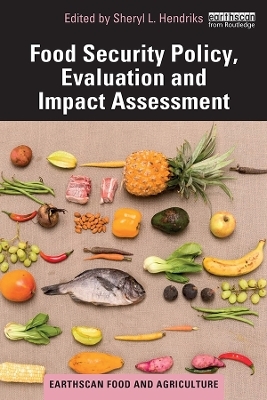
Food Security Policy, Evaluation and Impact Assessment
Routledge (Verlag)
978-1-138-49708-5 (ISBN)
This book offers an essential, comprehensive, yet accessible reference of contemporary food security discourse and guides readers through the steps required for food security analysis.
Food insecurity is a major obstacle to development and achievement of the Sustainable Development Goals. It is a complex issue that cuts across traditional sectors in government and disciplines in academia. Understanding how multiple elements cause and influence food security is essential for policymakers, practitioners and scholars. This book demonstrates how evaluation can integrate the four elements of food security (availability, access, nutrition and resilience) and offers practical tools for policy and programme impact assessment to support evidence-based planning.
Aimed at researchers, postgraduates and those undertaking professional development in food studies, agricultural economics, rural development, nutrition and public health, the book is key reading for those seeking to understand evidence-based food security analysis.
Sheryl L. Hendriks is Professor and Head of the Department of Agricultural Economics, Extension and Rural Development and Director of the Institute for Food, Nutrition and Well-being, University of Pretoria, South Africa.
Foreword
Dedication
Preface and acknowledgements
Notes on contributors
List of acronyms and abbreviations
Part 1: The fundamentals of food security policy assessment in the era of the SDGs
Chapter 1: Food security policy analysis as a key element in attaining SGD2 and addressing food policy failures of the past
Chapter 2: How the understanding of food security and nutrition shapes policy analysis
Chapter 3: Understanding the depth and severity of food security as a continuum of experiences
Chapter 4: Contemporary policy issues related to food availability
Chapter 5: Contemporary policy issues related to poverty and inequality and the imperatives to improve access to food
Chapter 6: Contemporary policy issues and the imperatives to reduce malnutrition
Chapter 7: Mitigating Negative Nutrition Transitions: Cultivating Diversity in Food Systems
Chapter 8: Contemporary policy issues in food assistance
Part two: Practical guidance on in the components of evidence-based food security policy analysis
Chapter 9: Assessing the Coherence of Broader Development Policies for Food Security
Chapter 10: The policy making process: Introducing the Kaleidoscope Model for food security policy analysis
Chapter 11: Developing and applying a theory of change assessment
Chapter 12: The essential elements of assessment, monitoring and evaluation to determine the impact of policies and programmes
Chapter 13: Identification of risks and vulnerable populations
Chapter 14: Institutional arrangements for governance, coordination and mutual accountability
Chapter 15: Gender and Food Security
Chapter 16: Inclusion and engagement with Indigenous Peoples
Part 3: Measurement and information systems
Chapter 17: Measuring food insecurity
Chapter 18: The Integrated Phase Classification approach as an example of comprehensive system approaches
Part four: Practical insights for implementation, monitoring and evaluation
Chapter 19: Notes from the field: challenges, solutions and promising ideas
Chapter 20: What next for evidence-based food security policy analysis?
Index
| Erscheinungsdatum | 04.12.2019 |
|---|---|
| Reihe/Serie | Earthscan Food and Agriculture |
| Zusatzinfo | 7 Tables, black and white; 24 Line drawings, black and white |
| Verlagsort | London |
| Sprache | englisch |
| Maße | 156 x 234 mm |
| Gewicht | 453 g |
| Themenwelt | Sozialwissenschaften ► Soziologie ► Spezielle Soziologien |
| Technik ► Lebensmitteltechnologie | |
| Technik ► Umwelttechnik / Biotechnologie | |
| Weitere Fachgebiete ► Land- / Forstwirtschaft / Fischerei | |
| ISBN-10 | 1-138-49708-8 / 1138497088 |
| ISBN-13 | 978-1-138-49708-5 / 9781138497085 |
| Zustand | Neuware |
| Informationen gemäß Produktsicherheitsverordnung (GPSR) | |
| Haben Sie eine Frage zum Produkt? |
aus dem Bereich


